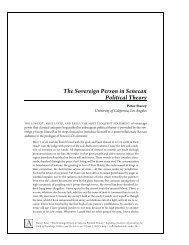Deceit, Desire, and the Literature Professor: Why Girardians Exist
Deceit, Desire, and the Literature Professor: Why Girardians Exist
Deceit, Desire, and the Literature Professor: Why Girardians Exist
Create successful ePaper yourself
Turn your PDF publications into a flip-book with our unique Google optimized e-Paper software.
LANDY | DECEIT, DESIRE, AND THE LITERATURE PROFESSOR: WHY GIRARDIANS EXIST 5<br />
Christi, a good form of imitation) 15 <strong>and</strong> direct our yearnings toward God (amor Dei, a good kind<br />
of desire), we will finally live in a world without violence. 16<br />
IMITATION-FREE VIOLENCE<br />
Stages Three <strong>and</strong> Four are so fanciful that it’s hard to know what to say about <strong>the</strong>m. (Wolfgang<br />
Pauli once said of a scientific <strong>the</strong>ory that it was “not even false”; I think that’s an apt characterization<br />
of all primordial fantasies, whe<strong>the</strong>r Sigmund Freud’s “Original Fa<strong>the</strong>r,” Denis Dutton’s<br />
“Pleistocene campfire,” 17 or René Girard’s founding scapegoat.) But let’s spend a moment on<br />
Stages One <strong>and</strong> Two. Since <strong>the</strong> <strong>the</strong>ory as a whole builds on <strong>the</strong>se claims, it seems to me that if<br />
we can show <strong>the</strong>y are bankrupt, <strong>the</strong> remaining postulates will take care of <strong>the</strong>mselves.<br />
Is it really true that all violence is a by-product of mimetic rivalry? Here’s <strong>the</strong> kind of situation<br />
Girard is asking us to imagine. Two men, Jimmy <strong>and</strong> Joey, st<strong>and</strong> beside a lake on a hot day.<br />
Jimmy decides to go for a swim. Joey, who would of course never have had this idea in his life,<br />
immediately decides to do likewise. Inevitably, this causes a death struggle between <strong>the</strong> two men<br />
as <strong>the</strong>y fight over <strong>the</strong> lake.<br />
Images by Jacqueline Basu<br />
The scenario above is of course absurd. Not only is it ludicrous to imagine that Joey<br />
couldn’t have had his own, autonomous hankering to take a dip (we’ll come to that in a moment);<br />
it’s also ludicrous to imagine that anyone in <strong>the</strong>ir right mind would start a fight in <strong>the</strong>se<br />
circumstances. (Beaches are simply littered with people not fighting with each o<strong>the</strong>r.) But why<br />
not? Isn’t it true that “as soon as we desire something that is desired by a model sufficiently close<br />
to us in space <strong>and</strong> time . . . we strive to snatch <strong>the</strong> object away from him”? No, of course it isn’t.<br />
Jimmy <strong>and</strong> Joey are st<strong>and</strong>ing right next to each o<strong>the</strong>r, yet Joey has no desire whatsoever to deprive<br />
Jimmy of his opportunity to swim. And <strong>the</strong> reason is simple: <strong>the</strong>re’s plenty of lake to go<br />
15 “A good model will make our mimesis good (Christ); a bad model will make our mimesis rivalrous” (“AC,” 269).<br />
16 Girard sees a glimpse of this in <strong>the</strong> endings of <strong>the</strong> novels he likes: “Deception gives way to truth, anguish to<br />
remembrance, agitation to repose, hatred to love, humiliation to humility, mediated desire to autonomy, deviated<br />
transcendency to vertical transcendency. This time it is not a false but a genuine conversion. . . . [T]he death of pride is<br />
[<strong>the</strong> hero’s] salvation” (DDN, 294).<br />
17 See, e.g., Denis Dutton, “The Pleasures of Fiction,” Philosophy <strong>and</strong> <strong>Literature</strong> 28, no. 2 (2004): 457.



